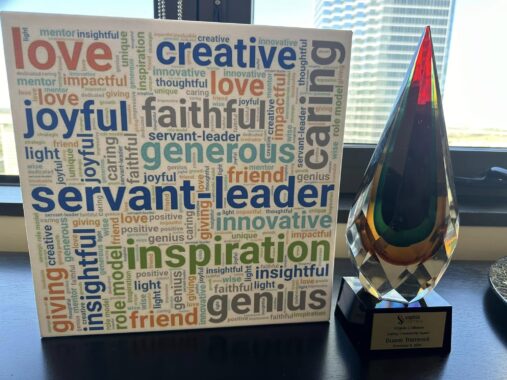Guest Blog: Conflict – A Forge for Exceptional Leadership
Guest blog by Paula Rauenbuehler, CEO & Founder of Leading UP, LLC.
At the heart of Paula’s approach is the science of human connection. By leveraging the power of emotional intelligence and neuroscience, she helps people transcend superficial solutions to achieve extraordinary results.
Conflict:
A Forge for Exceptional Leadership
Conflict is an inevitable part of the workplace.
It’s the uninvited guest at just about every workplace, the storm cloud on an otherwise sunny day. Yet, within this tempest, lies a potential for extraordinary leadership and team-building.
We often think of conflict as overt disagreement, a clash of personalities or ideas. But conflict can also be insidious, lurking beneath the surface, a silent undercurrent that erodes morale and productivity. Unresolved conflict, whether overt or covert, is a ticking time bomb in any organization.
Imagine conflict as a forge.

It’s a place of intense heat and pressure, where raw material is transformed into something stronger, more valuable.
For leaders, this forge is where potential is refined into exceptional performance. But the forge must be tended carefully. If left unattended, the fire can consume rather than refine.
Two essential qualities for navigating the forge:
 Servant Leadership
Servant Leadership
Servant-leaders are the cool heads amidst the chaos. They prioritize the needs of their team, listen intently, and empower others to find solutions. They build trust, one brick at a time, fostering a foundation of respect and collaboration.
 Emotional Intelligence (EQ)
Emotional Intelligence (EQ)
EQ is the compass in this turbulent sea. It’s about understanding not just the situation, but the underlying emotions driving it. By recognizing and managing their own emotions, as well as those of their team, leaders can navigate the treacherous waters of conflict with clarity and purpose.
These two qualities are not mutually exclusive; they are complementary.
A servant-leader often demonstrates high levels of emotional intelligence to effectively serve others. Conversely, an emotionally intelligent leader naturally prioritizes the needs of their team, a core principle of servant leadership.
When combined, servant leadership and well-developed EQ create a leadership superpower. It’s like having both a steady hand on the tiller and a keen eye on the horizon.
Leaders who possess both qualities can transform conflict from a threat to an opportunity.
But how does this translate into practical action?
Let’s explore some strategies:
Early detection:
Recognize the signs of both overt and covert conflict. This includes changes in behavior, communication patterns, and team dynamics.
Open communication:
Create a culture where people feel safe to express their concerns without fear of retribution. Encourage open and honest dialogue. Maintaining a culture of feedback in all directions is key.
Active listening:
Truly understand the perspectives of all parties involved. This involves not just hearing what people say, but understanding the emotions and underlying needs behind their words.
Empathy:
Put yourself in another person’s shoes to build rapport and foster understanding.
Problem-solving:
Work collaboratively to identify solutions that address the root causes of the conflict.
Building relationships:
Focus on rebuilding trust and fostering cooperation after the conflict has been resolved.
Conflict is inevitable. How you respond to it is what defines you as a leader.
By embracing the challenge, fostering a culture of open communication, and demonstrating both servant leadership and emotional intelligence, you can turn conflict into a catalyst for growth and success.
It’s time to redefine conflict.
Instead of seeing it as a problem or something to avoid, view it as a potential springboard for innovation and team building.
By harnessing the power of servant leadership and emotional intelligence, you can not only weather the storm but emerge stronger on the other side.
______________________________________________________
About the Author:

Paula is a seasoned strategist who transforms organizations from the inside out.
As a Professional Certified Coach with the International Coaching Federation and a Certified Leadership Development and Team Dynamic Coach, she brings a unique blend of evidence based rigor and real-world experience to her role as CEO/Founder of Leading UP.

Her journey as a HR Director in a variety of corporate settings has equipped her with a deep understanding of the challenges organizations face in cultivating high-performing teams and leaders.
Paula’s proven ability to enhance succession planning, boost employee engagement, and retain top talent is rooted in her extensive coaching practice.
For more info & to read her other blogs, visit her website.



